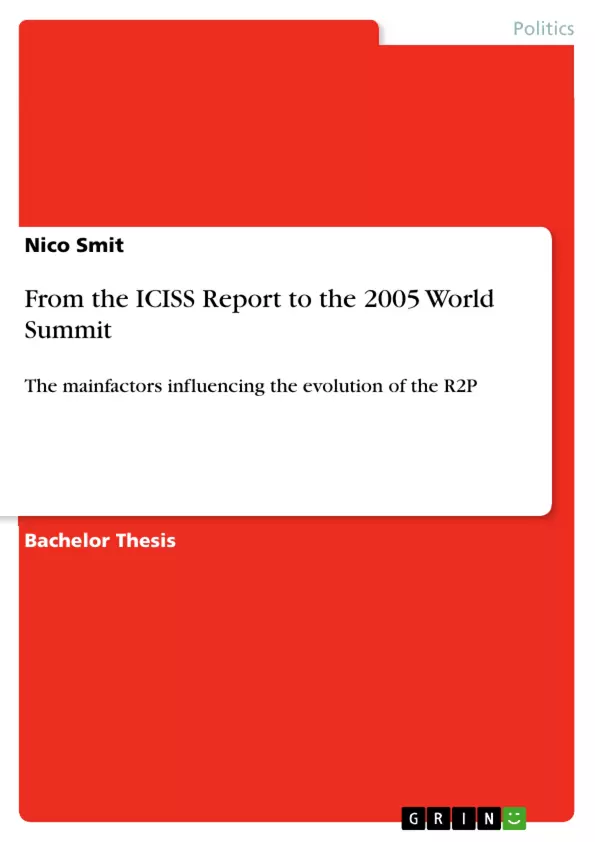
From the ICISS Report to the 2005 World Summit
Bachelorarbeit, 2010
60 Seiten, Note: 70
Leseprobe
Inhaltsverzeichnis (Table of Contents)
- Introduction
- Background to Humanitarian Intervention
- Meaning and Definition of Intervention
- The Concept of Humanitarian Intervention
- Humanitarian Intervention and the U.N. Charter
- The ICISS and the Responsibility to Protect
- Past Failures, the U.N. Secretary General's Challenge and the Establishment of the ICISS
- Francis Deng and the Concept of Sovereignty as Responsibility
- The ICISS and Sovereignty as Responsibility
- Core Principles of R2P
- R2P Principles for Military Intervention
- From the ICISS Report to the 2005 World Summit: Main Factors Influencing the Evolution of the R2P
- The 2005 World Summit and R2P
- The War on Terror and the 2003 War in Iraq
- The Crisis in Darfur
- The Problem of Security Council Buy-In
- Conclusion
Zielsetzung und Themenschwerpunkte (Objectives and Key Themes)
The purpose of this paper is to examine the evolution of the Responsibility to Protect (R2P) principle, focusing on the key factors that shaped its development. It examines the historical context of humanitarian intervention, analyzes the ICISS Report, and explores the implications of R2P in the context of international law and the contemporary world.
- The historical context of humanitarian intervention
- The evolution of the R2P principle
- The relationship between sovereignty and responsibility
- The role of international institutions in protecting civilians
- The challenges and controversies surrounding the implementation of R2P
Zusammenfassung der Kapitel (Chapter Summaries)
The introduction delves into the origins of the ICISS Report and its relevance in the context of the 9/11 attacks and the subsequent “War on Terror.” The report aimed to reignite the debate surrounding humanitarian intervention, particularly in the wake of incidents like the Rwandan genocide and the Srebrenica massacre.
Chapter 4 provides a historical context for humanitarian intervention, exploring its definition, evolution, and the legal framework surrounding it. The chapter highlights the challenges of reconciling humanitarian intervention with the principle of state sovereignty, as enshrined in the U.N. Charter.
Chapter 5 examines the formation of the ICISS and its groundbreaking report, “The Responsibility to Protect.” The chapter explores the concept of sovereignty as responsibility, introduced by the ICISS, and how it departs from the traditional view of sovereignty as control. It delves into the core principles of R2P and its implications for military intervention, highlighting the shift in perspective towards a greater emphasis on the protection of civilians.
Chapter 6 investigates the factors that influenced the evolution of R2P from the ICISS Report to the 2005 World Summit. The chapter analyzes the impact of the War on Terror, the 2003 invasion of Iraq, and the crisis in Darfur on the development and implementation of R2P. It also examines the challenges of achieving consensus and securing Security Council support for interventions based on R2P.
Schlüsselwörter (Keywords)
The key terms and concepts explored in this work include: humanitarian intervention, Responsibility to Protect (R2P), sovereignty as responsibility, state sovereignty, international law, just cause, right authority, military intervention, civilian protection, international institutions, U.N. Charter, the ICISS Report, War on Terror, 2003 War in Iraq, Darfur crisis, Security Council buy-in.
Frequently Asked Questions
What is the "Responsibility to Protect" (R2P)?
R2P is a global political commitment which asserts that states have a responsibility to protect their populations from mass atrocities, and the international community must intervene if they fail.
How did the 2003 Iraq War affect the R2P principle?
The war weakened the moral standing of the US and UK and created suspicion towards the R2P principle, as it was feared it could be used as a pretext for unauthorized interventions.
What does "sovereignty as responsibility" mean?
This concept, introduced by Francis Deng and the ICISS, shifts the view of sovereignty from "control" to "responsibility" toward a state's own citizens.
What was the role of the 2005 World Summit?
The Summit led to the formal international endorsement of R2P, although the final version lacked some of the specific criteria initially proposed in the ICISS report.
What is the significance of the Darfur crisis in this thesis?
The crisis in Darfur is used as a case study to examine the challenges of implementing R2P and the problem of securing UN Security Council support for humanitarian action.
Details
- Titel
- From the ICISS Report to the 2005 World Summit
- Untertitel
- The mainfactors influencing the evolution of the R2P
- Hochschule
- University of Cape Town (Department of Political Science)
- Veranstaltung
- International Relations
- Note
- 70
- Autor
- Nico Smit (Autor:in)
- Erscheinungsjahr
- 2010
- Seiten
- 60
- Katalognummer
- V210331
- ISBN (eBook)
- 9783656379829
- ISBN (Buch)
- 9783656381709
- Dateigröße
- 762 KB
- Sprache
- Englisch
- Schlagworte
- from iciss report world summit
- Produktsicherheit
- GRIN Publishing GmbH
- Preis (Ebook)
- US$ 19,99
- Preis (Book)
- US$ 29,99
- Arbeit zitieren
- Nico Smit (Autor:in), 2010, From the ICISS Report to the 2005 World Summit, München, Page::Imprint:: GRINVerlagOHG, https://www.diplomarbeiten24.de/document/210331
- Autor werden
- Ihre Optionen
- Vertriebskanäle
- Premium Services
- Autorenprofil
- Textarten und Formate
- Services für Verlage, Hochschulen, Unternehmen

- © GRIN Publishing GmbH.
- Alle Inhalte urheberrechtlich geschützt. Kopieren und verbreiten untersagt.
- info@grin.com
- AGB
- Open Publishing
Der GRIN Verlag hat sich seit 1998 auf die Veröffentlichung akademischer eBooks und Bücher spezialisiert. Der GRIN Verlag steht damit als erstes Unternehmen für User Generated Quality Content. Die Verlagsseiten GRIN.com, Hausarbeiten.de und Diplomarbeiten24 bieten für Hochschullehrer, Absolventen und Studenten die ideale Plattform, wissenschaftliche Texte wie Hausarbeiten, Referate, Bachelorarbeiten, Masterarbeiten, Diplomarbeiten, Dissertationen und wissenschaftliche Aufsätze einem breiten Publikum zu präsentieren.
Kostenfreie Veröffentlichung: Hausarbeit, Bachelorarbeit, Diplomarbeit, Dissertation, Masterarbeit, Interpretation oder Referat jetzt veröffentlichen!
- GRIN Verlag GmbH
-
- Nymphenburger Str. 86
- 80636
- Munich, Deutschland
- +49 89-550559-0
- +49 89-550559-10
- info@grin.com
-









